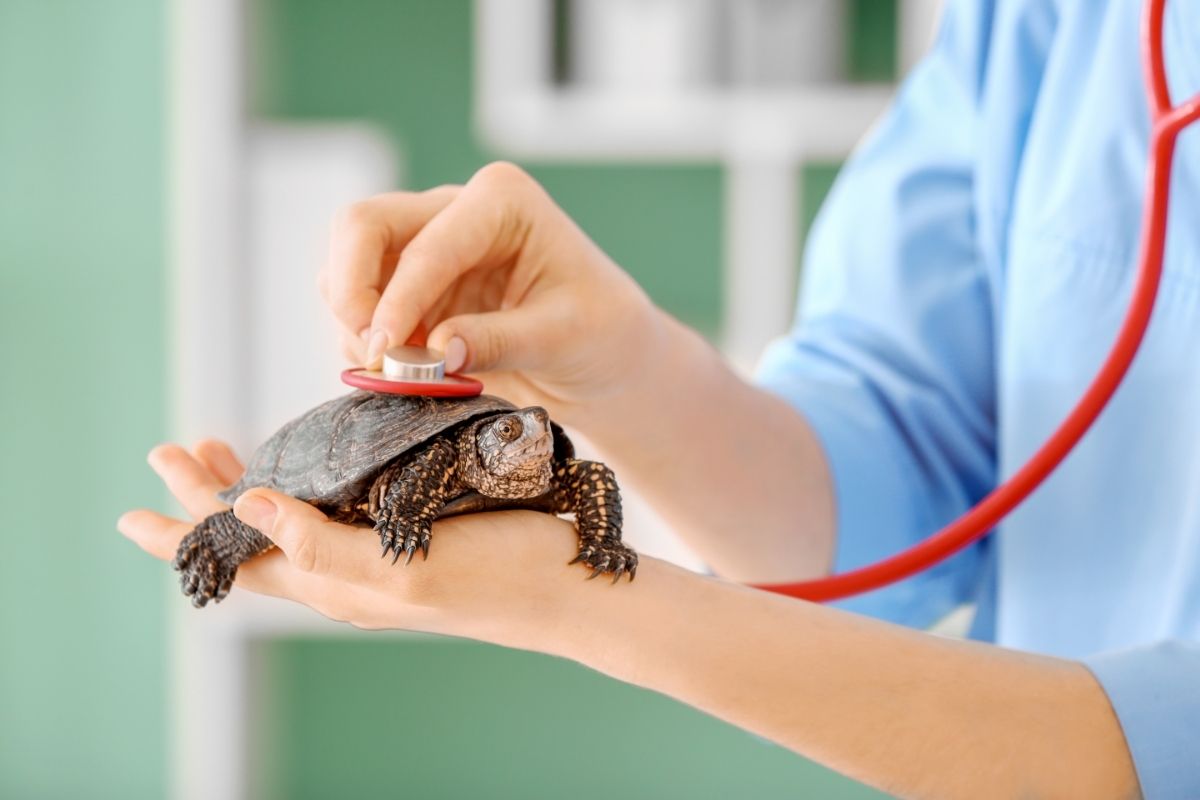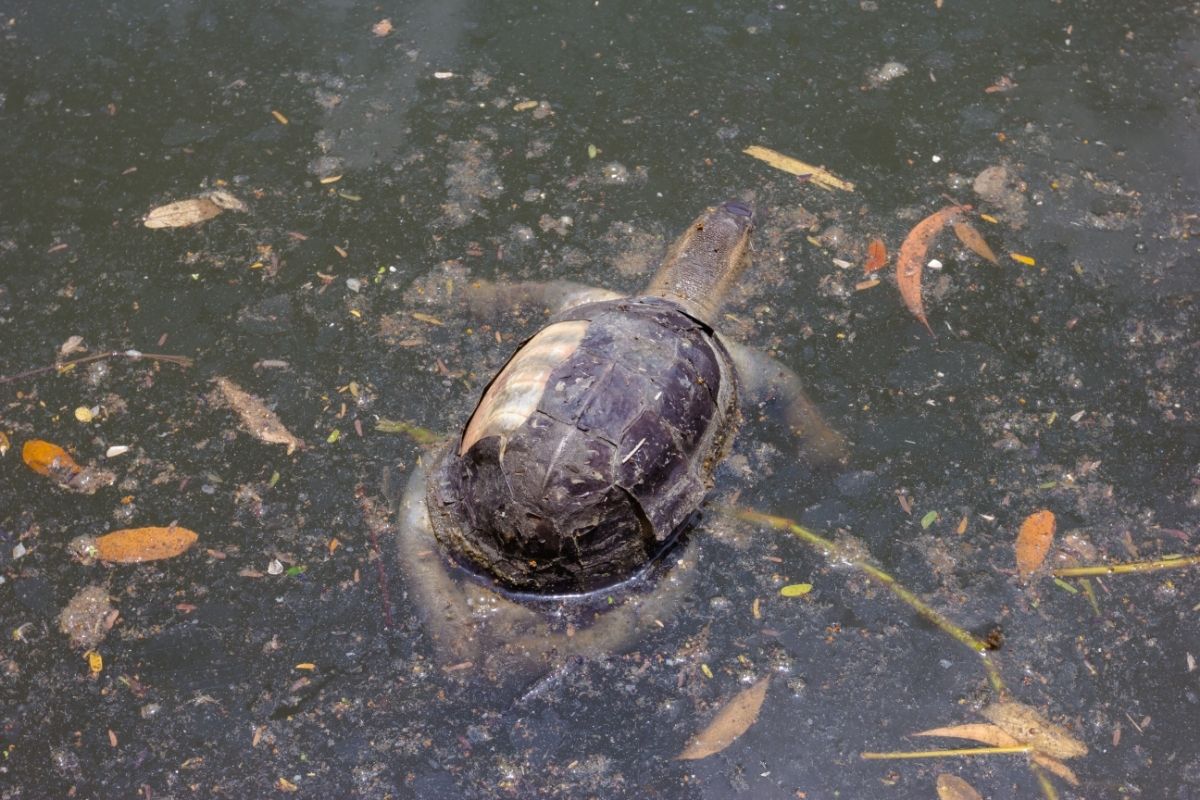Tortoises are growing in popularity as pets as they come with a lot of advantages and benefits that make them the ideal pet for some people over dogs, cats, and birds.
However, no animal is perfect and every kind of pet comes with its own risks and disadvantages.
Tortoises are no different and it’s important to be aware of all the things that could negatively impact your experience of owning a pet tortoise.

You might have heard about the connection between tortoises and salmonella, so let’s take a closer look at if this connection is worth your concern and consideration.
If you are worried about owning a tortoise and want to know what disadvantages you should be careful of, then keep on reading to learn everything you need to know about tortoises and their connection to salmonella.
What Is Salmonella?
Salmonella is a common type of bacteria that is most commonly associated with food-related causes and illnesses.
The main illness caused by salmonella is salmonellosis – the infection that most people commonly refer to as food poisoning.
Salmonellosis causes diarrhea and stomach cramps, as well as vomiting and fever.
These symptoms usually come 72 hours after exposure to the bacteria.
Although most people recover on their own within a few days, some severe cases require hospitalization and sometimes (although very rarely) cause death.
Salmonella is carried by both people and animals in their intestines and feces.
However, most salmonellosis is spread through contaminated food and caused by raw/undercooked food, unpasteurized milk, and dairy products, raw eggs, and poor handwashing after using the bathroom or changing diapers.
However, salmonella can be carried by pets including dogs, cats, and reptiles – which is where tortoises come in.
Salmonella is easily carried by skin, scales, shells and in the intestines of all kinds of reptiles and amphibians, even though it won’t always make them sick.
Some animals have built up a resistance to these bacteria, but they can still carry and infect humans.
Do Tortoises Carry Salmonella?

Like all pets, tortoises are capable of carrying salmonella.
They usually carry salmonella on their shells, which is the part that most people would come in contact with.
This is why a lot of people discuss salmonella and its link to tortoises over other pets like cats and dogs despite the fact that they too carry salmonella.
Salmonella can live on a tortoise and thrives in the folds of its skin.
Tortoises are very wrinkly creatures and heat and moisture can build up in their flaps, which is where salmonella loves to live.
This is because these folds can create the best kind of environment for salmonella to thrive.
As well as the skin and shell, salmonella also lives at the base of a tortoise’s scales. It is a very easy place to forget because it is such a small area, but salmonella can easily get down and spread between scales.
It is also possible for salmonella to spread through a tortoise’s feces.
This is because salmonella can live in the digestive system of reptiles and amphibians so when they excrete their feces, salmonella is often picked up through this system.
So, it is very easy for your potential pet tortoise to pick up and carry salmonella that can infect you and your family – but no higher than the risk is with any other pet!
How Do Tortoises Pick Up Salmonella?

It is difficult to pinpoint exactly how a tortoise can become infected with salmonella.
They can pick it up anywhere while roaming around your home, plus it could be you yourself that infects your tortoise and not the other way around.
Because of this, it’s important to wash your hands before and after handling your tortoise.
If you have been handling food that may be contaminated with salmonella (like eggs or raw meat) then you risk passing that infection on to your tortoise.
Wash your hands effectively by using warm soapy water for at least a full minute.
To limit the amount of salmonella around your home, keep surfaces clean and use antibacterial wipes to eradicate the bacteria.
The same goes with your tortoise’s tank or enclosure – keep it clean to stop salmonella from making a home there.
The key to keeping salmonella away from your tortoise (and your home) is cleanliness and good hygiene habits.
Frequently washing your hands before and after handling food will limit the chances of the bacteria living on your hands and spreading around your home.
If you have other pets at home, make sure to limit their contact with your tortoise and keep them clean and healthy.
How To Prevent Tortoises From Spreading Salmonella
Tortoises can pick up salmonella from anywhere – in or out of the enclosure.
Keeping your tortoise’s enclosure clean is vital for keeping salmonella infections at a minimum so make sure that you clean down under the substrate too.
This is because salmonella can spread through feces and excrement, so it’s important to keep the enclosure clean to stop your tortoise from stepping in their own waste and tracking it with them around the tank.
So, if your tortoise is already infected, stop them from spreading it to you by keeping their home clean and tidy.
This will also limit your risk of picking up the bacteria as you handle your tortoise.
Because most salmonella can be found on the tortoise’s shell, it’s important to wash your hands before and after handling your tortoise. You should also wear gloves to further limit your exposure.
Can You Get Rid Of Salmonella In Tortoises?
It is currently impossible to get rid of salmonella from the intestines of all reptiles, including tortoises.
Some people have tried to treat tortoises with antibiotics but these attempts have been unsuccessful and have sometimes resulted in the bacteria becoming resistant to antibiotics.
This will then make it even more difficult for us to cure people who are suffering from salmonellosis – so don’t try to give your tortoise any medication.
This is because salmonella won’t make your tortoise sick – unlike us, they have a resistance to it.
The only way you can even tell if your tortoise is carrying salmonella is if you get sick yourself frequently, so just keep everything clean and remember the importance of washing your hands.
Conclusion
So, tortoises carry salmonella – but this does not mean that you should not have them as a pet.
There are many benefits to having a tortoise as a pet and these worries that surround salmonella are just as prevalent in other kinds of pets like birds, cats, and dogs.
Although reptiles have a bad reputation when it comes to carrying salmonella, it’s also important to remember that salmonella is very easy to spread and can occur in lots of different places.
So, if you are considering getting a pet tortoise but you are concerned about salmonella, we say that you should still go for it.
After all, you are more likely to infect your tortoise with salmonella than they are to infect you!
As long as you follow the guidelines instructed above, then you should have no worries or fear around infecting your tortoise with salmonella (or vice versa).
That way, you can enjoy your lovely pet tortoise and shower them with all the affection they deserve!
